

Let’s honor the real Dr. King, ‘an extremist for love’ The postponement of the planned ceremonies dedicating the new memorial to Dr.
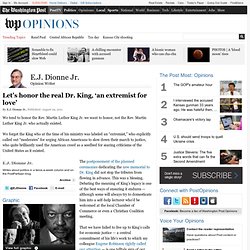
King did not stop the tributes from flowing in advance. This was a blessing. Debating the meaning of King’s legacy is one of the best ways of ensuring it endures — although some will always try to domesticate him into a self-help lecturer who’d be welcomed at the local Chamber of Commerce or even a Christian Coalition meeting. That we have failed to live up to King’s calls for economic justice — a central commitment of his life’s work to which my colleague Eugene Robinson rightly called our attention — is one telltale sign of our tendency to hear King’s prophetic voice selectively.
But selectively hearing him is better than not listening at all, as long as it doesn’t lead to a distortion of what he believed. Welcome to King Week Las Vegas Website! A dream still out of reach. Aug. 28 is the anniversary of the 1963 march and rally at which King delivered the indelible “I Have a Dream” speech.
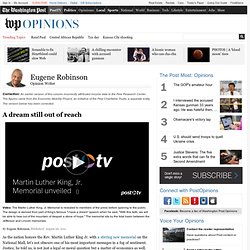
That event — one of the watershed moments of 20th-century America — was officially called the “March on Washington for Jobs and Freedom.” Meaningful employment was a front-and-center demand. The idea and impetus for the march came from A. Philip Randolph, one of the most important labor leaders in the nation’s history. Randolph founded the Brotherhood of Sleeping Car Porters, a union that demanded and won decent pay and better working conditions for thousands of railroad employees, most of them African American. King and his fellow civil rights leaders understood the importance of good jobs that paid a living wage — and the social and economic mobility such jobs provide — in forging a nation that honors its promise of fairness and equality. As an African American old enough to remember Jim Crow segregation in the South, I’m amazed at the progress toward racial justice.
Powell: King would rage about conditions. WASHINGTON, Aug. 28 (UPI) -- If Dr.
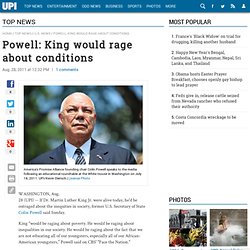
Martin Luther King Jr. were alive today, he'd be outraged about the inequities in society, former U.S. Secretary of State Colin Powell said Sunday. King "would be raging about poverty. He would be raging about inequalities in our society. He would be raging about the fact that we are not educating all of our youngsters, especially all of our African-American youngsters," Powell said on CBS' "Face the Nation. " The Martin Luther King Jr. Center for Nonviolent Social Change. A Poll Tax by Another Name. AS we celebrate the Martin Luther King Jr.
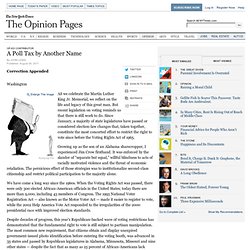
Memorial, we reflect on the life and legacy of this great man. But recent legislation on voting reminds us that there is still work to do. Since January, a majority of state legislatures have passed or considered election-law changes that, taken together, constitute the most concerted effort to restrict the right to vote since before the Voting Rights Act of 1965. Growing up as the son of an Alabama sharecropper, I experienced Jim Crow firsthand. It was enforced by the slander of “separate but equal,” willful blindness to acts of racially motivated violence and the threat of economic retaliation. We have come a long way since the 1960s. Despite decades of progress, this year’s Republican-backed wave of voting restrictions has demonstrated that the fundamental right to vote is still subject to partisan manipulation. Having fought for voting rights as a student, I am especially troubled that these laws disproportionately affect young voters.
Martin Luther King Jr. Would Want a Revolution, Not a Memorial. THE Martin Luther King Jr.
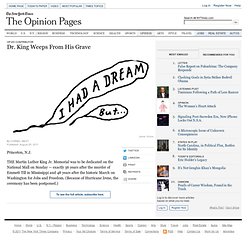
Memorial was to be dedicated on the National Mall on Sunday — exactly 56 years after the murder of Emmett Till in Mississippi and 48 years after the historic March on Washington for Jobs and Freedom. (Because of Hurricane Irene, the ceremony has been postponed.) These events constitute major milestones in the turbulent history of race and democracy in America, and the undeniable success of the civil rights movement — culminating in the election of Barack Obama in 2008 — warrants our attention and elation.
Building wealth takes more than bootstraps. Look at Henry Turley, a real estate developer, and Charles Ewing, owner of an eponymous moving company.
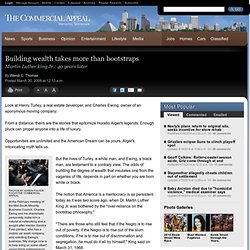
From a distance, theirs are the stories that epitomize Horatio Alger's legends: Enough pluck can propel anyone into a life of luxury. Opportunities are unlimited and the American Dream can be yours, Alger's intoxicating myth tells us. Photos by Karen Pulfer Focht/The Commercial Appeal At the February meeting of the Mid-South Minority Business Council, Charles Ewing and his charismatic personality make him a natural at networking and a sought-after mentor.
Sandra Ford (center), who has a mobile car wash company, was soliciting Ewing's business. Henry Turley meets with Memphis City school board president Tomeka Hart to discuss public education in Memphis. But the lives of Turley, a white man, and Ewing, a black man, are testament to a contrary view. The notion that America is a meritocracy is as persistent today as it was two score ago, when Dr. Turley has dreamed big and worked hard.